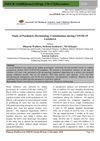 1 citations,
February 1988 in “The BMJ”
1 citations,
February 1988 in “The BMJ” The document explains different hair and scalp conditions, including common hair loss after pregnancy or illness, drug-induced hair loss, hereditary excessive hair growth, patterned baldness, autoimmune hair loss, and permanent loss due to skin disease, with generally limited treatment options.
53 citations,
July 2018 in “Drug design, development and therapy” Janus kinase inhibitors show promise in treating alopecia areata but need better topical formulations.
[object Object]  4 citations,
May 2023 in “JAAD case reports”
4 citations,
May 2023 in “JAAD case reports” Hyaluronic acid fillers for temporal lifting can cause hair loss without scarring.
The document provides detailed care instructions for elderly patients.
 December 2024 in “Archives of Dermatological Research”
December 2024 in “Archives of Dermatological Research” COVID-19 vaccines do not increase the risk of alopecia areata.
122 citations,
April 2020 in “American Journal Of Pathology” Skin aging is a complex process influenced by various factors, leading to wrinkles and sagging, and should be considered a disease due to its health impacts.
 4 citations,
January 2023 in “The journal of allergy and clinical immunology/Journal of allergy and clinical immunology/The journal of allergy and clinical immunology”
4 citations,
January 2023 in “The journal of allergy and clinical immunology/Journal of allergy and clinical immunology/The journal of allergy and clinical immunology” Biologics, especially Dupilumab, are effective and safe for treating severe childhood eczema.
 1 citations,
February 2023 in “Journal of cosmetic dermatology”
1 citations,
February 2023 in “Journal of cosmetic dermatology” PRP use in skin care and plastic surgery is growing, especially in the U.S. and Italy.
 April 2019 in “Abstracts”
April 2019 in “Abstracts” Adding colchicine stopped the girl's recurring heart issues caused by lupus.
 13 citations,
January 2011 in “Lung India”
13 citations,
January 2011 in “Lung India” Stopping isoniazid can reverse hair loss caused by the drug.
 January 2024 in “International Research Journal Of Modernization In Engineering Technology And Science”
January 2024 in “International Research Journal Of Modernization In Engineering Technology And Science” Licorice helps with acne, eczema, dandruff, hair growth, and skin health but may raise blood pressure.
 1 citations,
March 2024 in “BioDrugs”
1 citations,
March 2024 in “BioDrugs” Biologics for severe asthma have known side effects, but some new risks need more study.
 December 2020 in “Journal of medical science and clinical research”
December 2020 in “Journal of medical science and clinical research” Most child skin problems during the COVID-19 lockdown were not emergencies and could have been handled by teleconsultation.
 November 2020 in “Dubai medical journal”
November 2020 in “Dubai medical journal” Tofacitinib may effectively regrow hair in alopecia totalis patients.
 December 1988 in “Journal of The American Academy of Dermatology”
December 1988 in “Journal of The American Academy of Dermatology” The meeting covered new findings in children's skin conditions and treatments, including the benefits of super absorbent polymer diapers.
 222 citations,
September 2016 in “JCI insight”
222 citations,
September 2016 in “JCI insight” Tofacitinib is safe and effective for severe alopecia areata, but hair loss may return 2 months after stopping treatment.
 140 citations,
December 2017 in “Journal of Controlled Release”
140 citations,
December 2017 in “Journal of Controlled Release” Microneedles improve drug delivery in various body parts, are safe and painless, and show promise in cosmetology, vaccination, insulin delivery, and other medical applications.
 103 citations,
January 2011 in “Blood”
103 citations,
January 2011 in “Blood” Thymus transplantation successfully restored immune function in infants with FOXN1 deficiency.
 66 citations,
December 2018 in “Dermatology”
66 citations,
December 2018 in “Dermatology” Both ruxolitinib and tofacitinib are effective and safe for treating severe alopecia areata, but relapses are common.
 66 citations,
January 2010 in “Journal of The American Academy of Dermatology”
66 citations,
January 2010 in “Journal of The American Academy of Dermatology” Mycophenolate mofetil was effective for most patients in treating scarring hair loss, but some had side effects.
 49 citations,
August 2016 in “Aesthetic Surgery Journal”
49 citations,
August 2016 in “Aesthetic Surgery Journal” Micro-needling effectively improves wrinkles, scars, and hair growth, but proper technique and safety are important.
[object Object]  42 citations,
April 2021 in “Journal of clinical pharmacology”
42 citations,
April 2021 in “Journal of clinical pharmacology” Baricitinib helps treat several diseases, including COVID-19, but has side effects and needs careful monitoring.
 36 citations,
January 2018 in “Burns & Trauma”
36 citations,
January 2018 in “Burns & Trauma” NSAIDs may not affect soft tissue healing but should be used carefully for bone fractures and more research is needed to understand sex differences in response.
 30 citations,
June 2015 in “South African journal of botany”
30 citations,
June 2015 in “South African journal of botany” Traditional healers in Namibia use 70 different plants to treat AIDS-related diseases, and more research is needed to test these plants' effectiveness against HIV.
 13 citations,
March 1990 in “JAMA”
13 citations,
March 1990 in “JAMA” Topical eye β-blockers might cause hair loss, which usually gets better after stopping the medication.
 11 citations,
November 2021 in “BMJ Open”
11 citations,
November 2021 in “BMJ Open” People with alopecia areata have higher rates of mental health issues, autoimmune diseases, and infections.
 9 citations,
May 2021 in “International Journal of Dermatology”
9 citations,
May 2021 in “International Journal of Dermatology” The trial showed that a new under-the-tongue treatment for severe hair loss was somewhat effective in a small group of people.
 1 citations,
October 2023 in “Dermatology and therapy”
1 citations,
October 2023 in “Dermatology and therapy” Some treatments for severe hair loss work but often have side effects, with baricitinib showing the most promise.
 1 citations,
November 2016 in “Congenital Anomalies”
1 citations,
November 2016 in “Congenital Anomalies” Get head MRI for babies with achondroplasia early, use free immunoglobulin light chains to detect certain neurodevelopmental disorders, and video calls work for speech therapy in patients with facial anomalies.
 March 2023 in “PARIPEX INDIAN JOURNAL OF RESEARCH”
March 2023 in “PARIPEX INDIAN JOURNAL OF RESEARCH” Tofacitinib helped regrow hair in most patients with severe hair loss.


























